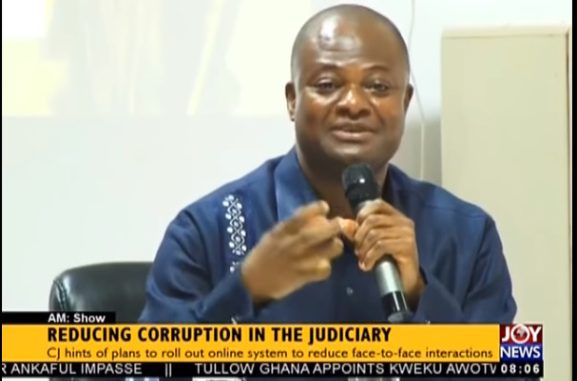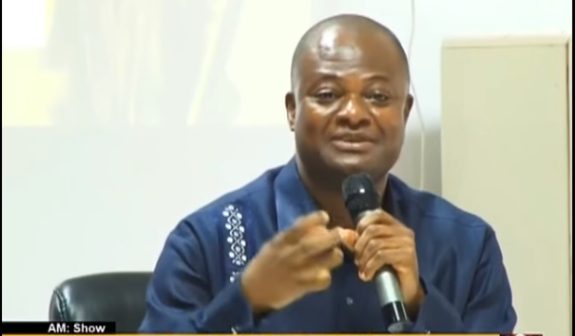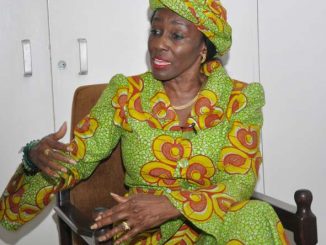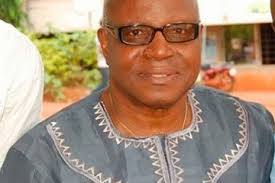
SIERRA LEONE BAR ASSOCIATION ANNUAL CONFERENCE AND GENERAL MEETING 2019*
Law and the New Developmental State in West Africa
*Keynote Address at the 2019 Annual Conference and General Meeting Sierra Leone Bar Association, 4th to 5th July 2019*
By Prof. Raymond A. Atuguba
Visiting Professor of Law and Henry J. Steiner Visiting Professor of Human Rights (2018-2019) Harvard Law School
Associate Professor of Law, University of Ghana School of Law ratuguba@law.harvard.edu/ratuguba@ug.edu.gh
+233244354572
Lagonda Complex, Freetown, Sierra Leone 4th July 2019
It is traditional to begin a keynote address by indicating that one is happy or glad to do so. On this occasion, and in line with the dictates of the central theme of my address, I must be forthright and say that I am really sad, almost angry, to deliver this keynote address.
And I say this unapologetically, without fear of ruining your celebratory mood; because that very mood, the extremely premature euphoria, the dance before dawn, is part of the phenomenon that I am sad, angry about.
Before we focus on my sadness and anger about Sierra Leone, and about Africa generally, let us put that sadness and anger in a global setting. In other words, what picture, what view, what outlay, do the rest of the 194 Countries in the world present; and how does Salone and her Bar Association fit in there?
That way, we can begin to surmise the issues we face here in their most “profound reality”, and more importantly, appreciate the courses of action we must take as the Salone Bar, and the sacrifices that are implicated thereby.
Today, the Global Picture, the view of “the world we live in” is pretty simple to crack, and does not appear to be changing in the near future; unless we intentionally, deliberately, positively, let it.
Politically, we are witnessing the death of Democracy and Good Governance and the rise of dictatorships and a new populism all over the globe; with the traditional democratic frontiers, the United States (whose birthday it is today) and Great Britain leading the pack. Economically, we are experiencing accelerated extractivism, as the G 20 countries continue to pillage every imaginable resource from poorer countries-human, material, cultural, technological; whilst killing, maiming, threatening, starving, corrupting, anyone in the line of the resources.
Socially, the world is so divided everyone is looking over their shoulder to see if their neighbor is about to throw a bomb or otherwise harm them; and nations are so scared of one another they now parade military tanks, flyovers, and fireworks at their independence parades.
Technologically, we are so screwed up, we use it to fight wars, rig elections to subvert the authentic choices of the people, and steal from each other. This is “the world we live in”.
No matter how much we pretend, and no matter how far we try to sweep it under the carpet, the Liberal Democratic Model is exhausted and almost dead.
That Model, the dominant Model in our time for getting any country out of poverty and unto a path of sustainable development and keeping it there, will be no more by 2020; yes, by next year. As Vladimir Putin told the Financial Times at the Kremlin exactly a week ago today, “The Liberal Idea Has Become Obsolete”, having “outlived its purpose”.
Putin is one hundred percent right, but for completely different reasons from those he espoused at the interview. I will come back to this later.
To return to the theme of global politics, and coming closer home, the BTI Regional Report for Africa for 2018, appropriately titled “A Divided Continent”, notes that:
“Between 2015 and 2017 Africa witnessed an overall deterioration in the quality of political and economic transformation and governance…it is striking that every criterion of democracy…recorded a decline.
The same was true of every measure of economic status and governance. The combined effect of these trends was to move the continent further away from political stability, democratization, and economic sustainability…While almost all African states hold multiparty elections that create the outward appearance of democracy, in many cases constitutions continue to confer disproportionate power on the president and ruling party.
The last few years has also seen the continuation of a decade long trend of democratic backsliding, with governments… deploying repression to deal with the challenges posed by the spread of social media and the emergence of increasingly assertive civil society groups and opposition parties.”
Even basic State stability appears to elude Africa. In the last decade alone, there have been coups in Madagascar in 2009 and in Niger in 2010. After the coups and uprisings in North Africa (Algeria, Egypt, Libya, Tunisia), at the beginning of this decade and joined by Djibouti also from 2000 and 2001; the army overthrew the governments in Guinea Bissau and in Mali in 2012. Benin, Comoros, and Chad experienced failed coup d’états in 2013, whilst those in the Central African Republic in 2013 and in Burkina Faso in 2014 succeeded. In 2015, another coup in the same country succeeded, but for just one week.
A “counter-counter” coup reinstalled the new deposed President, and yet another failed coup, still in Burkina Faso, occurred in 2016. After a failed coup attempt in the Gambia in 2014, another internationally orchestrated “coup” succeeded a few years later.
Burundi experienced a failed coup in 2015, and the interesting coup in Zimbabwe in 2017 is unforgettable.
The attempted coup in Gabon and the successful one in Sudan this year are both fresh in our memories. In the last two or so years, there have been 11 attempted or successful coups in the world, and 8 of these were in Africa.
Even countries that appear politically stable are not that stable. Mali, Nigeria, and many other countries live under the spectre and growing threat of terrorism.
Shinning stars like Ghana are slowly experiencing democratic reversals, and Sierra Leone is learning all the bad things from Ghana.
When a country starts to illegitimately remove constitutionally protected officers from their posts, including sitting Supreme Court judges, represses journalists, and interferes in court processes for really micro and meso level political agendas, the destructive seeds of authoritarianism and the annihilation of the freedoms of the people are sown.
It is no wonder that Liberia experienced a massive citizens demonstration last month, Sierra Leone experienced similar skirmishes in the same month, and just at the beginning of this month, the courts were used by the government of Ghana to temporarily subvert a demonstration.
Enough of politics; let’s move on to the economy. And I return again to the BTI assessment:
“Economic transformation also stalled during this period. Following the optimism of the “Africa rising” years, a combination of falling demand for commodity prices, the failure of many states to diversify their economies…led to lower than projected economic growth between 2015 and 2017. In turn, falling revenue placed significant pressure on government budgets, and thus constrained the policy levers available to many…Along with rising currency and price instability and the growing percentage of GDP that African states spend on servicing an increasingly heavy debt burden… this led to a deterioration in the standard of living.”
This is no news and has been happening since 1488 when the first European explorers arrived in Africa. Since then, Africa has been a living carcass, feasted upon for centuries by Euro-American, and lately by the other G 20 nations.
From 1980 to 2009, a period of less than 30 years, at least $1.2 trillion, spelt with a “t”, was lost from our dear continent in illicit financial flows, a terminology that does not cover all of the illegitimate outflows from Africa; it covers only “money earned illegally and transferred for use elsewhere…usually generated from criminal activities, corruption, tax evasion, bribes and transactions from cross-border smuggling…The numbers tell only part of the story…The illicit haemorrhage of resources from Africa is about four times Africa’s current external debt”. I say that again: “The illicit haemorrhage of resources from Africa is about four times Africa’s current external debt…Africa has been a net creditor to the rest of the world for decades.” And “The African continent is resource-rich. With good resource husbandry, Africa could be in a position to finance much of its own development.”
The report contains another set of really profound statements that we need to have front and center in our minds as we move into issue resolution mode:
“The composition of these outflows also challenges the traditional thinking about illicit money…[C]orrupt activities such as bribery and embezzlement constitute only about 3% of illicit outflows…criminal activities such as drug trafficking and smuggling make up 30% to 35% and commercial transactions by multinational companies make up a whopping 60% to 65%.
Contrary to popular belief…money stolen by corrupt governments is insignificant compared to the other forms of illicit outflow. The most common way illicit money is moved across borders is through international trade.”
Against this background, and in the last two segments of this address, I wish to focus on two things: democratic, good governance and economic policy reversals in Salone in the last few years, and more important, what the Salone Bar may do about these.
Salone has experienced many democratic reversals in the last decade. In 2015, the then President sacked his Vice President, unconstitutionally, and strangely, the Supreme Court endorsed it.
After the then Vice President won against the government at the ECOWAS court of justice, the previous government and this government have both failed to abide by the judgment.
I know this because I was the lawyer for the dismissed Vice President. Over the last few years, many persons who occupied constitutionally protected positions have been sacked or otherwise removed by government.
The recent removal of Members of Parliament and their illegitimate replacement are clearly contrary to the election laws that allow for those seats to remain vacant when an appeal is imminent.
Those laws also require another election to be held. This was not done. The fact that these actions were taken pursuant to judgments of the courts of law is very worrying indeed. This is the Sierra Leone we live in today.
On the economic front, Sierra Leone is still a favourite site for vultures to scavenge. Her mineral resources, agricultural lands, fishery resources, everything, is there for the taking by any multinational company that has a few dollars to throw around.
Recently, the government had to ban fishing by foreign trawlers in Salone waters. This is the world we live in.
What can be done about “the world we live in”? Let’s start with the political. Some 30 years ago, when many African countries, including Salone, experienced third wave democracy, and adorned themselves with new constitutions, those constitutions, representing quick, reluctant, creasy, political settlements and compromises, were just enough for their needs.
Today, those constitutions are no longer enough for their needs, and are definitely ultra-inadequate for their wants. What African countries need now is deep, participatory, reviews of their constitutional governance, undertaken in a manner that simultaneously builds citizenship and garners the nationalism that is essential for pushing through the governance reforms that all African countries badly need.
As happened with Ghana’s Constitution Review Commission, such reviews must extend beyond the Constitution, even beyond law, and touch the hardcore governance, developmental, and nation-building issues that need to be confronted.
I call on the Sierra Leone Bar to initiate this process. Be reminded that done properly, such a review will be effective even if it is not passed into law. It will serve as a constant reference point for the democratic guidance of the nation.
Still on the political solution, we need to be reminded that liberal democracy will be dead by next year, and so we must be brave enough to sing him a dirge (liberal democracy is definitely a “him”); dance the funeral-war dance; bury him; shed some tears; hug in sorrow; and move past him.
The new aspiring democracies and economic miracles in Africa-notably Mauritius, Botswana and Rwanda-did not reach there through liberal democracy. Indeed, those countries are increasingly becoming illiberal in several respects.
A reading of “Behind the presidential curtain: inside out of real Paul Kagame from his former bodyguard”, gives us an enlightening picture of the illiberal aspects of Rwandan governance. And although Botswana looks thoroughly democratic, their last President was in power for 10 years, and before that, he was Vice President for another 10 years, and even before that, he was commander of their army.
Perhaps, Kagame is following in the same footsteps. Let no one deceive us; 4 or 5 years, even 8 or 10 years of rule is woefully inadequate for any serious ruler to dig out the rot in African governance, lay a firm foundation, and begin to build a resolute structure on it. And without this, we are completely darned.
This means that the options for democratic constitutional design during the review process must remain open, and liberal democracy should definitely not be the only option.
I know that many are accusing me now of being a lover of autocrats and dictators. This is not so. Let us draw a line between African strongmen who take it out on their citizens and African strongmen who use their power to take greater control of their policy spaces and their economies and the destinies of their people and their nations. The two are very completely different orientations and uses of state power. I vote for the latter.
I move now to the second thing that needs to be done, and done now; the economic solution. I recall once again the words of Vladimir Putin. In the interview earlier referenced, Putin “condemned open-door policies toward migrants and said liberalism has gone too far at the expense of traditional values’…When the migration problem came to a head, many people admitted that the policy of multiculturalism is not effective and that the interests of the core population should be considered…He described German Chancellor Angela Merkel’s welcoming policy toward refugees…as a ‘cardinal mistake,’ and praised U.S. President Donald Trump, whom he described as a ‘talented person,’ for taking a much harder line on migration.
He continued: “The liberal idea presupposes that nothing needs to be done. The migrants can kill, plunder, and rape with impunity because their rights as migrants must be protected”.
To put this in context, Russia is home to some 10 million migrants, who work mostly in construction and retail, playing a vital role in that country’s economy, especially as the Russian population is aging.
Whilst we may hate Putin for what he says, there is a lesson in there for us Africans to learn. The same anti-immigration rhetoric and the same “nation-first” populism that characterise Putin and Trump, should be the same attitude and slogan for us when it comes to Africa’s resources. African countries must wise up and create a strong and unbreakable bond between her plentiful and much sought-after resources and her people. Any country that rejects and disrespects Africans must have absolutely nothing to do with her resources.
If you cannot accept African people, then do not take her resources. For every African who is denied entry to a G 20 country, one multinational company from that country and operating in Africa must be asked to pack and leave.
The world needs Africa more than Africa needs the world. It does not sound believable, but that is what the data, that is what science says.
The ultra-nationalism of the big boys, right down to building of walls and disrespectful immigration policies, must be met in equal measure with economic nationalism and the building of economic walls around African resources and the institution of disrespectful foreign investment policies.
In this regard, Tanzania, Zambia and Zimbabwe are showing the way, and should be praised and goaded on, not maligned.
The third thing that needs to be done, and which is a prerequisite for the first two solutions to succeed, is the reconstruction of what Kwame Nkrumah, that illustrious son of the African soil, called “the African personality and identity”.
The reconstruction of this social construct that has been so badly damaged is needed more today than ever before. “Make America Great Again”, “Brexit”, Putin’s antimigration effusions, and many other similar policies can only further damage the African personality, as Africans continue to experience a rough and disrespectful pushback from the G 20 countries they struggle to reach.
This reconstruction of the African Personality and Identity must start from the review of our curricula and teaching methodologies; through deliberate and intentional Africanist Civic Education; to a global occupation of new and nontraditional media with the “profound reality” of the African situation and prospects, as a basis for building the new African Personality and Identity. It must also reflect in everything; our ways of dressing inclusive.
I long for the day when African lawyers will appear in African courts and African Bar Conferences in African attire.
The fourth and final action point relates to technology. Africa has experienced three modes of domination since 1488. Political Domination in the form of colonialism of old, and the occupation of her policy spaces by the G 20 today; Economic Domination in the form of human and material extractivism of old, and mainly financial extractivism today; and Social Domination in the form of cultural imperialism of old and anti-African media today. However, there is a fourth budding form of domination-Technological Domination. In its most banal form, this mode of domination is palpable when election results are rigged using technological hijacking, and an imposter imposed on the people as their leader.
Africa must begin to rethink her encasement into a technological world that it does not fully understand and does not control.
Technology has its usefulness; but making your electricity, water systems, health systems, everything, dependent on technology that we did not make; that we do not fully understand; and that we do not control, is sheer madness. Ghana’s Electoral Commission reported recently that the controls of the electronic aspects of our voter systems are in the hands of an Israeli company, and Ghana retains no domestic keys to the systems. For Africa, a more strategic approach to the technological revolution is warranted.
Bar Associations in Africa have traditionally been trailblazers and harbingers of the hard truth. This is what the Kenyan Law Society, the Tanganyika Law Society of Tanzania, the Nigerian Bar Association, the Ghana Bar Association, the 5 or more Bar Associations in South Africa, and many others, did and continue to do for Africa’s progress.
I asked my Personal Assistant to research your current Bar President, Basita Michael, and this is what she found out: “Michael is known for her commitment to saying the hard truth and she has continued to take critical and independent positions on national issues since her election to the Bar presidency”.
“Most legal analysts have described her tenure as one that has risen the Bar’s bar. This has heightened public trust and confidence for the Bar”.
“Her integrity, reputation, honesty, straightforwardness, charisma and character have never been in doubt or in question since her name came into prominence several years ago, not as a politician but as a legal luminary”.
Owing to the appreciation of the public of the activities of the SLBA, the President was honoured by several organisations and she accepted them on behalf of the SLBA.
These recognitions include: 100 most influential Sierra Leoneans; 50 most influential women; outstanding female Legal Practitioner; Excellence in Law; Best Female Legal Practitioner; and an Honorary Award in recognition of the unflinching and relentless support to the youth of Sierra Leone.
To conclude this address, I call on the Sierra Leone Bar Association today to:
1. Get Organised;
2. Mobilise Resources-human, spiritual, material;
3. Create Working Groups for the four Themes (political, economic, social, technological);
4. Distil Clear and Simple Action Points for Immediate Implementation;
5. Advocate, Push, Agitate, for their Implementation; and
6. Use the Annual Conference and General Meeting as a Forum to Assess Progress on all of the above.
This is the only real role the Sierra Leone Bar Association should play today. The people of Sierra Leone are tired of the numerous and sophist parroting of liberal values at millions of meetings and workshops.
The people of Sierra Leone are yearning for, longing for, cannot wait for a true renaissance, a reorientation of governance through real and effective democratic guidance; political, economic, social, and technological governance; which meet the people at the point of their needs and wants.
The unofficial bifurcation of the Bar along the lines of the two main political parties must end. That is a by-product of inimical liberalism which I have told you will die next year. The unofficial remnants of patriarchy that exist within the Bar must also end. Basita has more than proven to us all that female lawyers are as competent, if not more competent, than their male counterparts.
I thank you for your attention and your tolerance of me, and look forward to interacting further with you during the Question and Answer session




